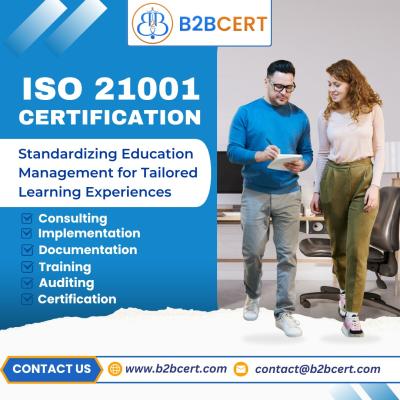Categories
Tags
Archives
Educational Institutions Thriving with ISO 21001 Certification
-
Posted by b2bcert pankajam Filed in Business #ISO 21001 in Kuwait #ISO 21001 Cost in Kuwait 70 views
Educational organizations around the world are increasingly recognizing the importance of structured management systems to improve quality, enhance learner satisfaction, and meet stakeholder expectations. ISO 21001, the international standard for Educational Organizations Management Systems (EOMS), provides a framework that supports consistency, continuous improvement, and accountability in the education sector. In recent years, many institutions have adopted ISO 21001 Certification in Kuwait to strengthen their educational processes and achieve better outcomes for learners and communities.
Often, these institutions partner with experienced ISO 21001 consultants in Kuwait to guide them through the development and implementation of effective policies and procedures, helping ensure they are fully prepared for the ISO 21001 audit in Kuwait. The following case studies highlight how educational organizations successfully implemented ISO 21001 and the benefits they achieved.
Case Study 1: Higher Education Institution
A higher education organization in Kuwait decided to adopt ISO 21001 in Kuwait to ensure consistency in course delivery and enhance student satisfaction. Prior to certification, the institution faced challenges related to inconsistent teaching methodologies, varied assessment processes, and unclear communication channels between students and faculty.
Working with ISO 21001 consultants in Kuwait, the institution reviewed its procedures and identified key areas for improvement. New policies were developed for curriculum design, assessment criteria, and academic feedback. The institution also established a formal mechanism for collecting student input and used these insights to guide continual improvement initiatives.
Positive Outcomes:
-
Greater consistency in teaching and assessment methods
-
Improved student satisfaction due to clearer communication and feedback
-
Stronger alignment between course outcomes and student expectations
While the ISO 21001 cost in Kuwait included consultancy, training, and system upgrades, the institution achieved measurable improvements and ultimately strengthened its reputation as a learner-focused organization.
Case Study 2: Private Training Center
A private training center sought ISO 21001 Certification in Kuwait to enhance the quality of its professional development programs and gain credibility with learners and industry partners. Before certification, the center struggled with inconsistent course scheduling and limited tracking of learner progress.
With support from ISO 21001 consultants in Kuwait, the training center established standardized procedures for curriculum development, instructor evaluation, and program review. They also implemented a system to monitor each learner’s progress and adjust instructional methods as needed.
Positive Outcomes:
-
Increased learner engagement and training completion rates
-
Better alignment of programs with industry requirements
-
Enhanced organizational efficiency and effectiveness
The center successfully passed its ISO 21001 audit in Kuwait, demonstrating its commitment to delivering high-quality education. The initial ISO 21001 cost in Kuwait was offset by the long-term benefits, including improved learner satisfaction and the ability to attract new participants.
Case Study 3: K–12 School System
A K–12 school decided to pursue ISO 21001 in Kuwait to improve its management processes and ensure consistent quality across multiple grade levels. Key challenges included inconsistent curriculum delivery among classrooms and limited parental involvement in school decisions.
Assisted by ISO 21001 consultants in Kuwait, the school developed a comprehensive quality management system that included standardized lesson plans, teacher training programs, and regular performance evaluations. The school also created an open communication platform for parents and students to provide feedback.
Positive Outcomes:
-
Improved consistency in teaching across classrooms
-
Enhanced parent and student involvement in school activities
-
Greater transparency in decision-making and educational planning
Despite the investment involved in ISO 21001 cost in Kuwait, the school experienced long-term improvements in learner achievement and family satisfaction. The ISO 21001 audit in Kuwait provided independent confirmation of the school’s commitment to quality education.
Key Lessons from Successful Implementations
Across different educational sectors, the following key lessons emerge from the successful implementation of ISO 21001:
1. Leadership Engagement
Strong leadership is essential in driving the implementation process and maintaining commitment to quality and improvement.2. Stakeholder Involvement
Involving stakeholders—such as students, parents, faculty, and community partners—ensures the system is responsive to their needs and expectations.3. Standardized Procedures
Developing and implementing standardized procedures helps promote consistency and transparency in academic and administrative processes.4. Continuous Improvement
A focus on continual improvement enables educational organizations to adapt to changing learner needs and remain competitive.5. Expert Guidance
Partnering with experienced ISO 21001 consultants in Kuwait improves the efficiency and effectiveness of implementation and prepares the organization for a smooth ISO 21001 audit in Kuwait.Conclusion
These real-life case studies demonstrate how ISO 21001 Certification in Kuwait can significantly improve educational management systems and lead to better outcomes for learners, educators, and stakeholders. Whether in higher education, vocational training, or primary and secondary schools, ISO 21001 helps institutions standardize processes, engage stakeholders, and foster continuous improvement.
Although the ISO 21001 cost in Kuwait involves an initial investment in system development, training, and audit preparation, the long-term benefits far outweigh these costs. Educational organizations that embrace ISO 21001 and work closely with ISO 21001 consultants in Kuwait are well-positioned to deliver consistent, high-quality education and meet the evolving needs of learners and society.
By learning from successful examples and focusing on structured, learner-centered processes, institutions can ensure a smooth ISO 21001 audit in Kuwait and build a strong foundation for sustainable educational excellence. Moving forward, ISO 21001 will continue to play a crucial role in helping educational organizations in Kuwait improve performance, increase transparency, and deliver value to all stakeholders.
-
